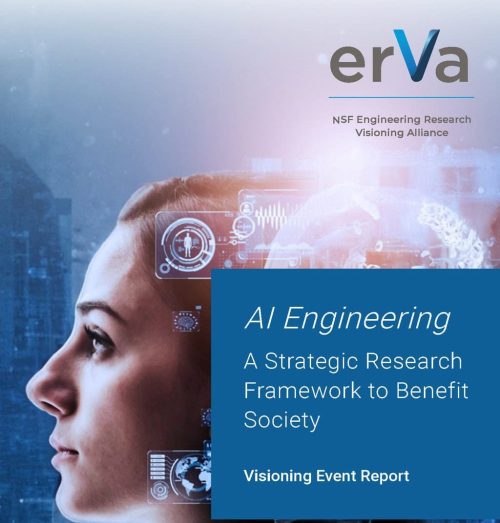New Report: Engineers Have a Generational Opportunity to Harness AI for Good

Engineering Research Visioning Alliance’s (ERVA’s) latest report identifies a pathway for the U.S. to take the lead in AI Engineering.
A new report released by the Engineering Research Visioning Alliance (ERVA), an initiative funded by the U.S. National Science Foundation (NSF), identifies key research directions needed to take advantage of the generational opportunity of “AI Engineering,” defined as the accelerating convergence of the artificial intelligence and engineering fields to deliver benefits to society.
A late 2023 poll showed that the U.S. public is more concerned than excited about the progress of AI. At this critical turning point in its development, it is crucial that AI systems adopt the engineering discipline’s commitment to safety and systems to serve the greater good. Engineers are uniquely positioned to lead the charge in harnessing AI’s potential and shaping its future direction, according to the new report, AI Engineering | A Strategic Research Framework to Benefit Society. At the same time, AI holds the potential to enable greater, more efficient engineering feats, provided engineers are equipped with the skillsets needed to apply AI to processes and tasks.
“This emerging fusion of the AI and engineering fields represents a profound opportunity to make breakthrough research advances as well as to address some of the most pressing challenges facing society today,” said Pramod Khargonekar, professor of electrical engineering and computer science and vice chancellor for research at the University of California, Irvine, and chair of the visioning event. “By leveraging AI to enhance engineering research and innovation and vice versa, we can achieve unparalleled progress and create a brighter future for all.”
Khargonekar and Birgit “Bea” Braun, Dow Chemical, who served on the event’s thematic task force, will present key findings from the report during a public webinar on June 20, 2024 at noon Eastern.
AI Engineering is based on the firm commitment of engineering processes and culture to ethics of safety, health, and public welfare. According to the report, AI and engineering practitioners, enabled by collaboration among government, industry and academia, can work to address 14 “grand challenges” of AI Engineering that fall under three categories of action:
- Design, Manufacturing, and Operations: Creating secure, reliable and trustworthy AI systems, which can then allow engineers to transform manufacturing quality and efficiency, build AI-engineered systems with cradle-to-grave awareness and scale engineering as never before
- AI Engineering and Society: Constructing systems for safe and productive human-AI collaboration, mitigating mishaps, and ensuring ethical foundations for the technology
- National Initiatives for AI Engineering: Overcoming information barriers and sector and discipline silos to enable national collaboration between engineers and AI practitioners in government, industry, and academia, and also training the new AI Engineering workforce through new institutes of higher education and academic courses
In an era marked by rapid technological advancement and societal transformation, AI Engineering is a pivotal discipline poised to transform the future of our world. By seamlessly integrating AI capabilities with established engineering principles, practitioners can unlock unprecedented innovation across various sectors.
AI Engineering | A Strategic Research Framework to Benefit Society is the eighth report released by ERVA, an initiative funded by the NSF to help identify future engineering research directions. The executive summary and full report, based on a visioning event convening 28 engineering researchers from academia, industry, and government agencies, can be found on ERVA’s website here. Visit ERVA’s website to see the previous reports: Engineering Materials for a Sustainable Future, Engineering the Future of Distributed Manufacturing, Engineered Systems for Water Security, Sustainable Transportation Networks Engineering, R&D Solutions for Unhackable Infrastructure, Leveraging Biology to Power Engineering Impact, and The Role of Engineering to Address Climate Change.
ERVA is funded by the National Science Foundation.
About The Engineering Research Vision Alliance (ERVA):
The Engineering Research Visioning Alliance (ERVA) is a neutral convener that helps define future engineering research directions. Funded by the NSF Directorate for Engineering, ERVA is a diverse, inclusive and engaged partnership that enables an array of voices to impact national research priorities. The five-year initiative convenes, catalyzes and enables the engineering community to identify nascent opportunities and priorities for engineering-led innovative, high-impact, cross-domain research that addresses national, global and societal needs. Learn more at ERVAcommunity.org.


